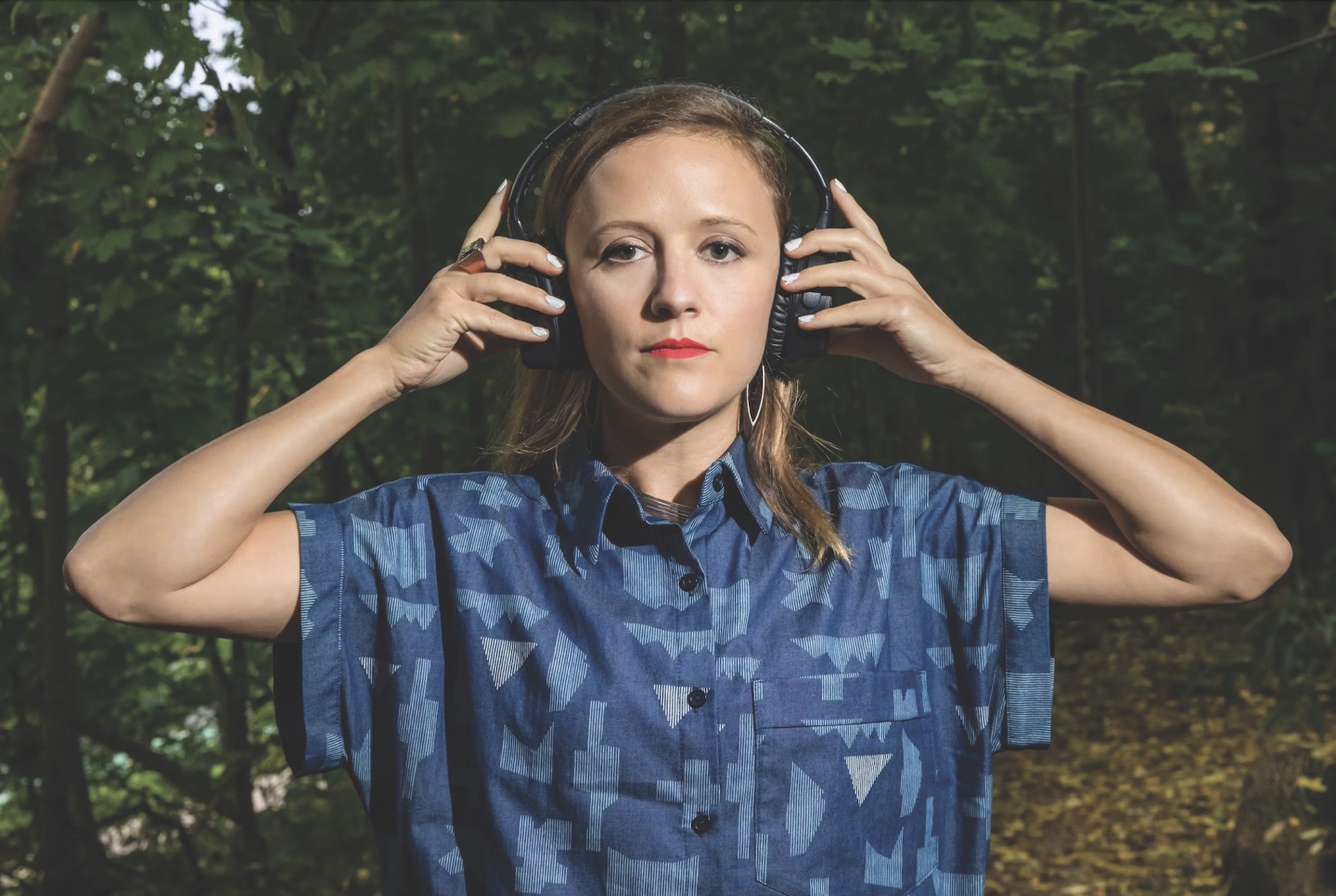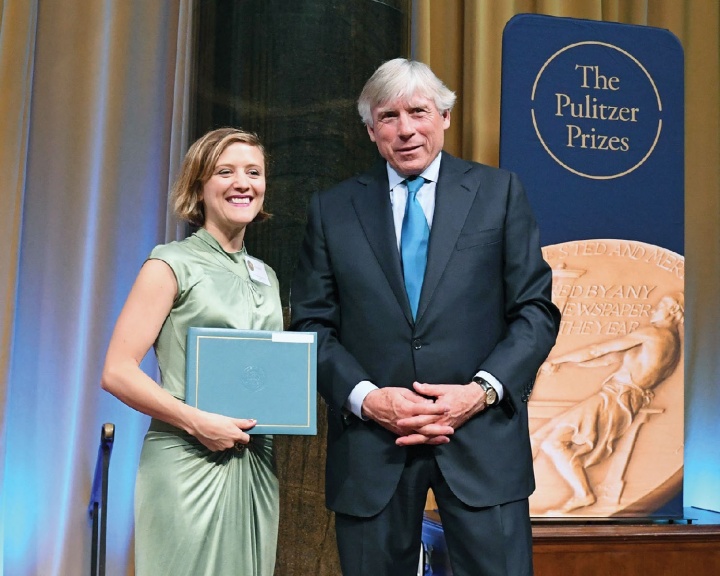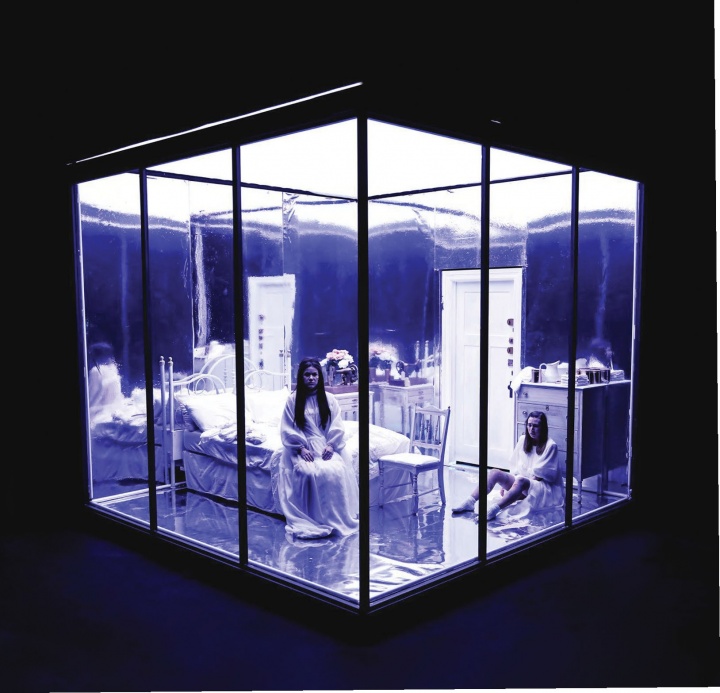Pulitzer Prize-winning composer and sound artist Ellen Reid ’05 takes on artistic challenges with an open spirit.
Columbia College | Columbia University in the City of New York
Pulitzer Prize-winning composer and sound artist Ellen Reid ’05 takes on artistic challenges with an open spirit.

The Ellen Reid Soundwalk series was inspired by parks around the world.
ERIN BAIANO
In late February, Ellen Reid ’05 boarded a KLM flight bound for Amsterdam, where she had been named composer-in-residence for both the world-renowned Royal Concertgebouw Orchestra and its acoustically superb concert hall, the Concertgebouw. A full schedule of new works and collaborations awaited her, beginning with final rehearsals for the world premiere of her second opera, The Shell Trial, commissioned by the Dutch National Opera.
So as Reid crossed the Atlantic that night, she had plenty to look forward to, including life in Amsterdam itself, a place rich in beauty, charm, history and of course, bicycles — massive numbers of them. This can be daunting to newcomers, even those who live in fast-paced Brooklyn and Los Angeles, as she does. “I’m working up the courage,” she said. “But yes, I have a bike. I have my helmet. I’m ready to go.”
Openness to challenge is Reid’s hallmark, along with the emotional power of such works as p r i s m, the opera that earned her the 2019 Pulitzer Prize in Music. During her still-young artistic career, she has teamed up with major symphony orchestras and chamber groups, theater and film productions, jazz soloists and cutting-edge software engineers, all adding to her growing reputation for adventurous, compelling artistry. In 2015, she contributed music for a “mobile opera” by Yuval Sharon that took place inside 24 cars winding their way through downtown L.A. For an instrumental piece in 2019, members of the Los Angeles Philharmonic were positioned on different floors of Walt Disney Concert Hall. In a work for Opera Omaha, she transformed a playground swing set into kid-friendly interactive sound sculpture, using car mufflers, oil drums, tail pipes, helium caps, plastic tubing and a motorcycle wheel.
Asked how she chooses her instrumental palette, Reid reframes the question. “It’s not necessarily about the instruments, but about the timbres or the colors, how to achieve them with whatever instruments there are,” she says. “It’s really fun as a creative person to push the way that they’re used to meet the timbres that are in my imagination.”

Reid (with President Lee C. Bollinger in 2019) was encouraged by her Columbia professors to pursue music composition.
Eileen Barroso
Nadia Sirota, an acclaimed violist, conductor, producer and podcaster who has worked closely with Reid in recent years, marvels at the distinctiveness of Reid’s compositional voice. “Sometimes you can listen to her music and think, oh, that’s classical opera. Sometimes you can listen and think, oh, that’s sort of electronic ambient work. Yet it all sounds like Ellen, which is really impressive,” Sirota says. “Her material just is so attractive, and smart, and unexpected. It lends itself beautifully to so many different contexts. But it’s always very striking and interesting and very Ellen.”
One easily accessible way to enter Reid’s artistic world is through her ambitious series, Ellen Reid Soundwalk, co-produced by Sirota. Inspired by 16 urban parks around the world, each Soundwalk uses advanced geolocation technology to match Reid-composed soundscapes with specific paths and vistas in the parks. Using a free app, listeners can tour the natural environments at their own pace, on their own routes, each triggering a continuous stream of music matched to those locations.
The Soundwalk project began with Manhattan’s Central Park in 2020, followed by Griffith Park in L.A. and eventually embracing city parks from London to Tokyo. (She recently reworked the Central Park installment to include the Lincoln Center campus and The Juilliard School.) The music is scored for the New York Philharmonic, the Kronos Quartet and British-Barbadian tenor saxophonist Shabaka Hutchings, among other collaborators. “The cool thing about making Soundwalk is that I can’t control how anybody does it,” Reid says. “It’s how the listener wants to use it. That’s really exciting for me as a composer who normally makes work in more controlled environments, to have something that’s so free.”
Reid’s newest album, Big Majestic: Music from Ellen Reid Soundwalk, draws on the scores of several of the Soundwalks, knitted together to form what the composer terms a “through-composed” piece. “It moves through different kinds of genres,” says Sirota. “It has synthesizer and orchestral music. It has jazz. It spans this broad musical landscape through the different pieces of music. But it all connects through the composition.”

A scene from The Shell Trial, performed by the Dutch National Opera. Reid’s second opera, with a libretto by Roxie Perkins, had its world premiere in Amsterdam earlier this year.
© MARCO BORGGREVE / DUTCH NATIONAL OPERA
She is paying her good fortune forward: Along with fellow composer Missy Mazzoli, Reid cofounded Luna Composition Lab, a mentorship program aimed at self-identified female, nonbinary and gender-non-conforming composers in their teens. Since it began on a shoestring in 2016, the program has grown in staff, budget and results.
“Ninety-five percent of our students major in composition in universities and conservatories, and 100 percent remain active in music in some way,” says Mazzoli, who is one of the first women commissioned to compose a new work for the Metropolitan Opera (Lincoln in the Bardo, due in 2026). “Ellen and I are very close friends, but have very different skills,” she notes. “I’m really into the numbers — building a budget and fundraising — and Ellen has this amazing vision for the long-term future of the program.”
Growing up in Oak Ridge, Tenn., Reid discovered her love of music and theater at an early age. She played Gretl in a first-grade staging of The Sound of Music, took piano lessons, sang in church choirs and played percussion in the high school marching band. During her College years she reveled in the city’s cultural offerings and often went to jazz clubs and edgy music venues like The Stone, in Greenwich Village.
“At Columbia I learned how to form, articulate and investigate my own point of view,” Reid says. “I learned how to debate and hold space for differing opinions, and I learned the power of protest.”
Lewis was largely responsible for her turn to composing, she says. When Reid was a senior in his musicology class, Lewis happened to hear some music she had created for a different course. Intrigued, he encouraged her to focus on creating original works. Reid also impressed Professor Brad Garton in his introductory course on digital sound. “The stuff Ellen produced for the class was just kind of stunning,” he recalls. “She really had a sense of happiness, and people jumped on her enthusiasm bandwagon. It’s great when a student like her comes along.”
“For artists it’s always a balance between what you do to pay your rent and what you do to feed your soul.”
After graduation, Reid spent a few years in Thailand, first teaching music at an international school in Chiang Mai, then as the music director at a Bangkok theater. There, she got to work with Thai classical musicians. “It really opened my mind to different ways of creating compositional form and shape,” she says. “I was immersed in that for a while.”
She returned to teach music in New York and L.A. public schools for five years, while writing music for theater companies. Then it was off to California Institute of the Arts for an M.A., an experience Reid calls “super awesome.”
“I’m interested in interdisciplinary collaboration, and at CalArts we were able to work with dancers, and I was able to meet theater directors and performers. There was support within the school to do that kind of thing.”
Before she was able to commit fully to life as a composer and sound artist, Reid worked as a nanny, a temp, a grant writer — whatever she needed to do to get by. “There’s a lot of shame around artists having to hold other jobs,” Reid says. “But that’s just not realistic. For artists it’s always a balance between what you do to pay your rent and what you do to feed your soul.”

Reid’s Pulitzer Prize-winning opera, p r i s m, tells the story of a mother and daughter struggling with the aftermath of a sexual assault.
THEO COTE
“It’s told in three acts with really different musical landscapes to illuminate the story and set the scenes. As the daughter discovers more of what happened to her, the soundscape reflects that.”
Reid is herself a survivor of sexual assault, but emphasizes that the story is fictional and that she is wary of her personal experience becoming people’s focus, rather than the art. “I’m comfortable with people mentioning it; it’s just sometimes that takes away from the power of the work,” she says.
The Pulitzer citation praised her use of “sophisticated vocal writing and striking instrumental timbres to confront difficult subject matter.” The program for the ceremony, held in Low Library, described p r i s m as “a haunting, kaleidoscopic new work of opera-theatre that traverses the elasticity of memory after trauma. Composer Ellen Reid’s music erupts with color, using choral and orchestral manipulation to deliver an eerily distinct sonic world.”
Reid’s schedule heated up quickly once she arrived in Amsterdam and settled in for the season with her husband, designer Adam Manjiro Lesser, and their infant daughter, Simone.
First came the March 16 premiere of The Shell Trial, inspired by an ongoing real-life legal drama. (“A Brechtian cri de coeur about climate change and complicity, this is an ambitious, passionate show,” The New York Times said in a review.) Just weeks later came a Royal Concertgebouw program showcasing five of Reid’s compositions, along with works by Vijay Iyer, Meredith Monk and others.
There are significant works in progress, too. In November, the Royal Concertgebouw Orchestra will debut Reid’s latest as-yet-untitled symphonic work, under the baton of wunderkind conductor Klaus Mäkelä; they will also perform the work later that month at Carnegie Hall and the Kennedy Center, a career milestone for any composer. Also in November, Reid will curate the Noon to Midnight Festival at the Los Angeles Philharmonic, featuring mostly L.A. talent. And in April 2025, the Concertgebouw will present Reid’s composition Today and today and today and today and today and today and today and today and today on a program that includes works by Nico Muhly ’03.
As impressive as Reid’s many accomplishments have been, it is her wide-open spirit and artistic integrity that have endeared her to teachers, friends and fellow artists — often one and the same.
“She is extremely small in stature and extremely large in personality,” says Nadia Sirota. “One of the people that she reminds me of on some level is Dolly Parton, in that they’re both very small people from Tennessee whom you should not underestimate.
“Ellen similarly is just an absolute force to be reckoned with,” Sirota continues. “She can work in so many different contexts, but it’s always extremely true to her voice. And that is a gift. That is extremely special.”
Former CCT editor Jamie Katz ’72, BUS’80 has also held senior editorial positions at People, Vibe and Latina magazines and contributes to Smithsonian Magazine and other publications. A former jazz director of WKCR, he is currently working with public radio producer Aaron Cohen on the fourth season of the award-winning podcast Embrace Everything: The World of Gustav Mahler. Katz profiled composer Nico Muhly ’03 for the Spring 2017 CCT cover story, “The Music Man.”

Published three times a year by Columbia College for alumni, students, faculty, parents and friends.
Columbia Alumni Center
622 W. 113th St., MC 4530, 6th Fl.
New York, NY 10025
212-851-7852
cct@columbia.edu

Columbia Alumni Center
622 W. 113th St., MC 4530, 4th Fl.
New York, NY 10025
212-851-7488
ccalumni@columbia.edu